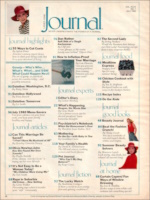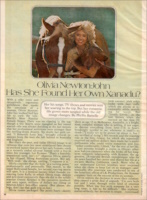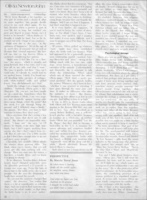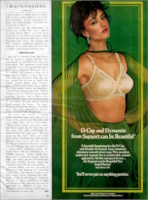Olivia Has She Found Her Own Xanadu?
80sClick to enlarge, issue number 240





With a silky voice and deceptively ingenuous girlishness that masks the emotions of a woman, Olivia Newton-John has worked half her life to earn the title, World's Most Popular Female Singer. There was no clawing to the top, though a few hearts were mangled as her career soared-—she was always deciding at the last minute that her professional ambitions were stronger than her settling-down dreams. No doubt her gold record, I Honestly Love You,
brought cynical responses from the men she left behind in Australia and England.
But that's the past, and today Olivia's image is so virtuous that even her most strait laced fans choose to overlook lapses that prove her only human — such as a recently ended six-year liaison with a live-in lover, her manager, Lee Kramer. That's a horrible, sensational term, isn’t it?
observes Olivia quietly, in her clipped, lilting Australian accent. But apt. Well, yeah," she shrugs, smiling, “I suppose it is.
Olivia concedes that she feels at a turning point,
professionally and personally. This month, to the usual Hollywood hoopla, her second starring movie will open. It is a musical fantasy titled Xanadu, co-starring Gene Kelly, in which Olivia sings, dances and acts more extensively than she did in the wildly popular Grease. Kramer is the executive producer and once again, millions of dollars are riding on Newton-John's box-office appeal. (But please, she begs, don't lay that guilt trip on her.)
Olivia comes packaged like petits fours—dainty pink sweater, pink ankle socks with lace cuffs, which she plucks at occasionally while searching for words. But Lovely Livvie,
as she was known when she starred on her first TV show at age 15 in Melbourne, Australia, is a bright, kind, complex woman who is willing, if not eager, to discuss ever thing from love — (It is heart- breakingly painful to me whenever it ends
) —to death (I really try to be grown up about it, but I am terrified of dying
).
Hit records and the starring role in the film, Grease, for which she reportedly received ten million dollars, have made her a multi-millionaire who could retire tomorrow and live, rather comfortably, I think,
for the rest of her life.
Last autumn brought a storm in Olivia's other wise halcyon existence when she broke off her long-term romantic relationship with Kramer, the aggressive, 28-year-old British entrepreneur who for six years handled her career and shared her life at a six-acre Malibu, California, ranch. Many who do not understand Livvie's loyalties were surprised when she chose to keep Lee on as manager - and, ironically, this interview was conducted in one of the luxurious offices of LK Productions, the Kramer company built on the success of his ex-woman.
Olivia admits the decision to sever their relationship caused a great deal of anguish. I’m sure both Lee and I went through every kind of emotion possible. When you live with someone for a very long time, it has to be difficult.
She explains, matter-of-factly, her decision to retain the artist-management relationship: We’ve been through a lot together, so why not? It seems such a shame if, after six years together two people decide
never to see each other again. It’s too bad, because when a person is part of your life for so long, has watched you grow and shared so many things, isn’t it better to be friends?
Olivia thinks so. I thought it might be hard, but so far it’s worked out well. I hope it can continue.
Right now she is, she says, at the optimum of happiness.
Yet at the age of 31, newly free of romantic ties as well as illusions that eternal ingenues
like herself can stay on top forever, Olivia is cautiously considering her options. Right now, I feel like I'm on a freeway,
she muses, which is straight and going forward. But it has exits. And I can turn off on any side road that I want
.
One exit I could take, if I decide to, would lead to my perfect house. Lately, I've found myself doodling little pictures of cottages, with white-washed walls and picket fences. Very old-fashioned, isn't that? Inside the cottage I see a happy family, children.Suddenly Olivia grins a dazzling grin.
Ah, you see, you have caught me on a good day. Sometimes when the world situation is bleak, I am very negative and decidedly against having children — poor things, what's the point? But this week I've got through being depressed. and I definitely want a family.
She pauses. But then, you have to find someone to marry first, don't you?
Olivia mentions that she is seeing a few men, but none that she'd care to talk about.
She doesn't set impossible standards. I hope not,
she says, or I'll always be lonely. I do have high standards. but I don't expect anything from anyone else that I don’t expect from myself. But it's not easy. I'm a little insular in that I don't have enough time to go out and meet many people.
Cheerfully, but candidly, Olivia admits she worries about growing older. You think, when you're twenty, that you will never get old, that nothing will ever change. Then you stare into the mirror, a line here, a wrinkle there. and you know it is going to change.
To an observer, Newton-Johns delicate beauty hasn't changed noticeably since she plausibly portrayed a 17-year-old in Grease two years ago. From the halo of flaxen hair to the ankle socks, she is pure preppie; but she sees the deepening of laugh lines around the mouth. It's not just the cosmetic changes that matter.
she observes. You realize that there is a lot of superficiality in relationships. And you want to find someone who loves you for what's inside, so that when the looks begin to go, it won't matter.
She thinks about that for a moment. You see, I am very, very conscious of it [aging] but I don't want to get paranoid and start — you know, there have been a lot oi women who were beauties when they were young who have taken to drinking, using drugs, because they can’t handle the changes. And I can see how it happens. I just don't want that to happen to me.
It is even harder, she supposes, if you’re used to being the center of attention, as I’m afraid I have been. I have been very, very spoiled, and I imagine that makes it even more difficult. And I want to prepare myself for that. Put down some roots.
Of course, Olivia pulled up whatever roots
might have been established when she broke with Lee Kramer. What had appeared to be a potentially permanent relationship quickly vanished, leaving Olivia free and alone
living at the hilltop ranch with her two cats, eight dogs, seven horses, a housekeeper and caretaker of the animals. Understandably and discreetly, she is reluctant to talk about the relationship when asked which one of them rejected the other.
Olivia gasps, well, that's a pretty personal question!
But she gamely tackles the answer. Whenever she’s been in love, whether I was rejected or rejecting. I have gone through the same pain each time. It makes no difference who takes the initiative, it hurts.
She frowns. Breaking up love affairs is as low as you can get. And falling in love is as high.
It was in 1973 in Monte Carlo when both Olivia and Lee Kramer were vacationing in the Riviera that they met and fell in love. Lee, often described as a young Robert Redford, was a self-confessed playboy with a lucrative business in London as a wholesaler of cowboy boots; Olivia had just recorded Let Me Be There,
her first disk to become a best-seller in the U.S. A romance between salesman and songstress kindled fast—and within two days Kramer canceled his vacation to follow Olivia back to England. She, meanwhile, broke with her fiance, a British rock musician who reportedly went off the deep end for a while. Shortly afterward, Kramer followed Olivia to America.
Both admit it was a tempestuous on-off affair. He came from a conservative Jewish family. It took a long time for me to got my father to even meet Olivia,
Kramer has said, because she wasn't Jewish, and because she was an entertainer. It’s doubtful, however, that religious differences mattered deeply to the lovers. Olivia turned her back on religion years ago. She remembers, I went to a Presbyterian school, and my father was an older in the church. But when I was about twelve years old, I began to slip away; I just couldn’t accept the way our Minister of our church, answered my questions on religion. I canceled my confirmation two weeks before it was due to
take place.
She has not returned to church since, and feels no guilt about it.
There also was no guilt when Newton-John began living with Kramer. But Olivia concedes now that living together without marriage may be psychologically damaging. I think about that now.
she admits, hesitantly. When I was younger. I was very self-conscious about the idea of cohabitation. But then, as I got older, I noticed that perhaps sixty percent of the couples I knew were living together and only forty percent were married. Still somehow society accepts marriage but doesn't accept living together.
But Olivia became convinced (she will not say by whom) that cohabitation was a viable concept for testing a relationship. But now I'm wondering,
she says softly. if maybe you should make the commitment to marriage in the beginning and then work on it — rather than live together, testing each other all the time. Because either way. you're going to find things wrong with one another. And — I‘m not really sure of this, but I do wonder — is it possible that you might try a little harder when you're married to keep it together?
No more speculation. That part of her life is over, though Kramer still helps plan her life. The wood paneled wall behind her chair is hung with a dozen Olivia Newton-John records framed and labeled To Lee Kramer
—-gifts from the music industry to the young man who presumably guided her toward such hits as Have You Never Been Mellow
, You're the One That I Want
and Hopelessly Devoted To You
.
Lee and I fight about business decisions
Olivia says, but I still trust his judgment. his tastes and he cares about me. He’ll fight for me, which makes our management-artist relationship a rare one in this town.
He is also protective of his chief bread winner. At Newton-John interviews the comforting presence of a woman publicist is a stipulated requirement. It seems odd, because Olivia appears totally competent to conduct one-on-one exchanges with the media.
Oh. I have a few insecurities,
she confesses. like the fear of dying. That really does scare me. When I get on planes, I think about it a great deal. I guess what frightens, me is the idea of nothing.
If she believed in religion, she acknowledges, I wouldn't be so worried, would I?
Then there are the nightmares. I dream very vividly. For years I had a a recurring dream that I was back in a classroom, for an important exam, and I looked at the questions and had no idea what they were about. The teacher and other students completely ignored me, made me feel terrible and unwanted, but I couldn’t pull myself out of the chair.
She can be detached now. She hasn't had the dream in months. Besides, she understands it; you don’t fear what you understand.
The nightmare traces back to the days when she was 16 and won a local talent contest in Melbourne and a TV contract, and wanted to drop out of high school to follow a career. Her parents, who had divorced when she was ten, wanted her at least to finish high school. Livvie’s father, Bryn Newton-John, a Welsh academician, was a college dean. Her mothers father was Max Born, a Nobel Prize-winning physicist.
What I wanted to do was definitely against family tradition,
she says, and my father - who had a booming voice — let me know about it.
Her father, she says, played classical music around the house. For years, whenever I heard the classics, I would be upset. The music saddened me, because it was associated with disapproval.
But Olivia did succeed in leaving home, breaking away and claims to be closer to her parents now than when she was a child. They visit her ranch often. When you’re young, you don't realize that these people are the ones who care the most, who really understand because you have the same roots.
The emphasis on the word roots
says much about Olivia’s thinking now. Although she did leave home at an early age, worked her way to England and became a singing star, she’s clung to the values instilled by a strong-willed, well-bred family. She credits them with her refusal to use unladylike language, smoke, drink more than wine — a half-glass actually gets me high.
She rarely attends Hollywood parties, she confides, because drugs are commonly used and she rejects them.
Perhaps Olivia, who has put most of her energy into forming her successful career — she’s won several Grammys and other music honors, including the OBE, Order of the British Empire, bestowed last year by Queen Elizabeth - is ready now to pass on the values she has come to appreciate to children of her own. Though as she herself says, she’ll have to find someone to marry first. End